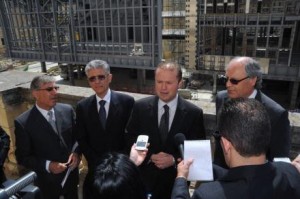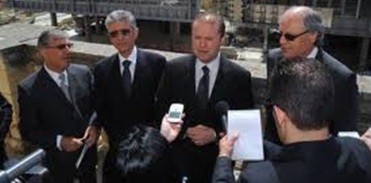 Labour leader Joseph Muscat sounded the Opposition’s first statement against the financing of the City Gate project’s special purpose vehicle, saying Labour will not support the parliamentary resolution to transfer the airport’s and cruise liner terminal’s leases to Malita Investments plc.
Labour leader Joseph Muscat sounded the Opposition’s first statement against the financing of the City Gate project’s special purpose vehicle, saying Labour will not support the parliamentary resolution to transfer the airport’s and cruise liner terminal’s leases to Malita Investments plc.
Muscat said the government was clearly unable to finance the €80 million project for a new parliament and the open-air theatre, and had resorted to a special purpose vehicle that will “rob future generations of state revenues” over the next 20 years.
Malita Investments will take the rents from Malta International Airport and the Viset cruise terminal and also issue shares to the public to finance the project for Valletta’s entrance.
“These are the island’s two main gateways – we are not against the airport’s and cruise liner terminal’s privatisation and management, but transferring the terminal and land leases without the sanctioning of parliament, is a red line for us that cannot be crossed,” Muscat said.
The Labour leader also said the Opposition was not against the financing system of SPVs: “in the case of Enemalta, we would favour this system to finance the energy corporation.”
Labour MP Karmenu Vella said he suspected some €28 million in reduced capital expenditure durig the first six months of 2011 could have been thrown into the SPV.
Malita Investments has €150 million in authorised share capital, with €15 million having already been issued.
“Was there ever a plan to finance City Gate? We feel the reason the government had to resort to the SPV was that the European Commission would not allow it to indebt itself any further,” Vella said, who also referred to data released yesterday showing national debt increasing to 72% of gross domestic product.
Labour’s other spokesperson on finances, Charles Mangion, reinforced the notion that Malita was effectively hiving off revenues from the airport and cruise liner terminal leases, that were intended for the state coffers.
“It’s an interests financing model, but the government is simply taking revenue away and throwing it into the SPV. So tomorrow’s revenue is already being spent – today – without having even receive it yet.
“The consequence is that some expenditure, somewhere, has to be cut, whether on capital or recurrent expenditures.”
Labour MEP and economist Edward Scicluna, also present for the conference held by the government housing that faces City Gate, said there was “nothing like a free lunch”.
“If government does not have enough revenue to finance a capital project, then it has to rely on debt. We could argue that on a long-term loan this project could have been financed at the rate of €3 million a year… in this case what we are seeing is a commitment to finance an €80 million project using the SPV over the next 20 years, at a rate of some €10 million a year.
“The SPV helps government spread out the burden… but the burden is still there, and even heavier still.”
– maltatoday : Tuesday, 24th April, 2012
– one news –

